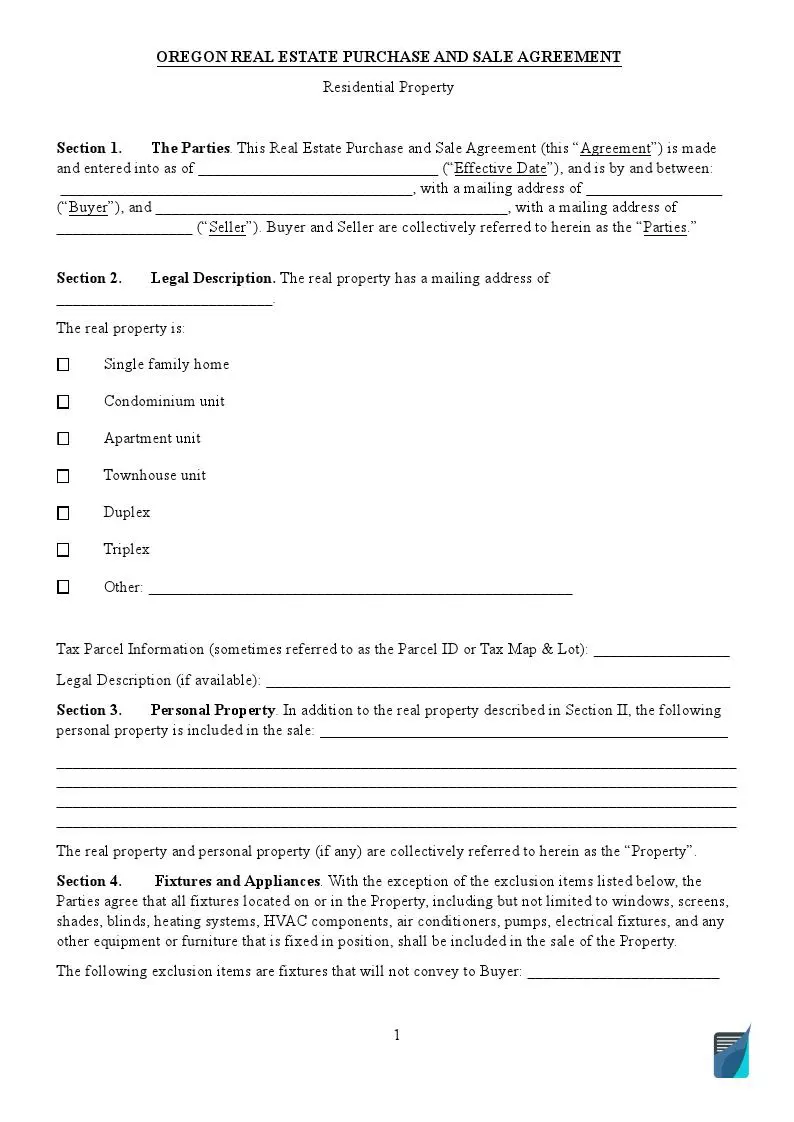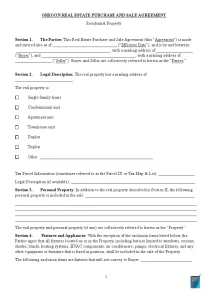Oregon Real Estate Purchase Contract
Buying or selling real estate invariably comes with a considerable amount of paperwork. The main document in the course of such a transaction is the real estate purchase agreement.
In this article, we will briefly review the main components of such a contract and pay attention to the disclosures that the seller must make before signing the printable purchase and sale agreement.

Build Your Document
Answer a few simple questions to make your document in minutes
Save and Print
Save progress and finish on any device, download and print anytime
Sign and Use
Your valid, lawyer-approved document is ready
Oregon Residential Purchase and Sale Agreement
In Oregon, the purchase agreement for residential property is usually prepared by the buyer. They submit a form to the seller, thereby making an offer. After that, negotiations are held, during which the parties either reach an understanding and sign an agreement (often with some changes or additions) or terminate the deal.
Mandatory parts of the agreement:
- Listing of the parties to the transaction, their full names, and addresses
- Property description
- Price, including earnest money and payment schedule
- Financial terms
- Insurance and title terms
- Inspection terms
- Closing details
- Disclosures
- Deadline for the adoption of an agreement
- Signatures and dates
According to § 105.465 (2) of Oregon Law, the seller is required to complete and provide the prospective buyer with a Disclosure Statement. Below we will tell you what that is.
It is very important to write down all the deadlines in the contract. If the seller delays in making a decision, the deal may no longer be of interest to the buyer. And given specific deadlines, both parties will understand how much time they have for discussion.
Oregon Commercial Purchase and Sale Agreement
This type of document is similar to the previous one, except for one item. The subject of the agreement is commercial real estate. The commercial real estate purchase agreement will contain all the same parts as the residential one.
It is especially worth considering the indication of terms and deadlines in such a document. Usually, the buyer of commercial real estate needs to receive the property at a specific time. And the seller also has time limits. Therefore, it is worth thinking about this right away when drawing up contracts so that the parties do not delay each other.
The inspection point is equally very important. Although the seller discloses to the buyer information about the material condition of the building, the buyer has the right to check this information for accuracy. For this purpose, an independent certified specialist is hired to inspect the building/premises within the period specified in the agreement. Based on the results of the inspection, the parties usually conduct additional negotiations.
Required Seller Disclosures in Oregon
Above, we mentioned that the seller is obliged to provide some disclosures to all potential buyers. Here is a list of the disclosures.
1. Lead-Based Paint Disclosure
If a house built before 1978 is on sale, then this document must be created. It will indicate if hazardous lead paint was used in the construction of the house. The rule is applicable in all states of America according to 42 US Code § 5842d.
2. Seller’s Property Disclosure Statement
Per 105.464 of Oregon Law, a seller discloses the knowledge of property damage and defects to buyers who have notified them in writing of their intention to buy a home.
The application includes an official paper in the form of a questionnaire about:
- Title to the property and existing encumbrances
- House structure
- Systems and fixtures
- Insulation
- Sewage disposal
- Domestic water sources
- Additional material defects
The person filling out the application is given three answer options — “yes,” “no,” “unknown.” It is important to note that choosing the “unknown” option is appropriate. The seller is not obliged to carry out an additional inspection to complete the statement. It will be the buyer’s responsibility to clarify the situation on such issues.
The seller cannot answer “I don’t know” only to the last question regarding additional material defects. Here you need to answer either “no” or list these defects. These can include mold in the bathroom or the presence of insects. Such defects either require elimination by the seller or a decrease in the value of the property.
3. Initial Agency Disclosure
This disclosure is required if any real estate licensees are involved in the transaction, and they are obliged to disclose their status to all parties to the negotiations. This is specified in Rule 863-015-0215 of the OAR.
To Sum Up
In the final part of the article, we would like to explain why it is crucial to make a truthful disclosure. Some may think that it is better to hide information and get more money for the house than telling and fixing defects or reducing the price. This is not true. After all, if you deliberately hide any troubles in the house, the buyer will have every right to sue you. And in the end, you will lose much more money and time than you could have originally.
Also, honest disclosure allows tuning the relationship between the parties in the right way. It is much easier to negotiate when both parties are honest about their obligations.
